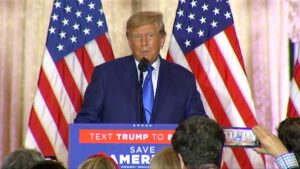Concerns over disinformation grow after Musk relaxes Twitter ban on political ads
As advertisers depart Twitter in the wake of Elon Musk’s recent takeover, the billionaire owner continues to shake up the social media platform, which on Tuesday relaxed a ban on political and issue-based advertising put in place for over three years.
When then-CEO Jack Dorsey announced the ban in October 2019, he explained that “this isn’t about free expression. This is about paying for reach. And paying to increase the reach of political speech has significant ramifications that today’s democratic infrastructure may not be prepared to handle.”
The Twitter Safety account revealed the policy change in a pair of tweets late Tuesday:
We believe that cause-based advertising can facilitate public conversation around important topics. Today, we’re relaxing our ads policy for cause-based ads in the U.S. We also plan to expand the political advertising we permit in the coming weeks.
Moving forward, we will align our advertising policy with that of TV and other media outlets. As with all policy changes, we will first ensure that our approach to reviewing and approving content protects people on Twitter. We’ll share more details as this work progresses.
Politiconoted that “advertisers have fled the platform in droves after Elon Musk’s takeover last October, which was followed by a spike in hate speech and the reinstatement of several previously banned right-wing accounts. The move also puts Twitter in alignment with several of the other major social media companies, such as Meta’s Facebook and Google’s YouTube, which both allow paid political content. One notable exception is ByteDance’s TikTok, which still has a ban on political advertising.”
Some digital media experts noted issues with the 2019 ban. For example, Fight for the Future director Evan Greer on Wednesday pointed to what climate journalist Emily Atkin called “Twitter’s Big Oil ad loophole” in her February 2021 reporting.
Tim Karr, senior director of strategy and communications at Free Press, said he was skeptical that Musk would pair the ban reversal with the sort of fact-checking “that would actually ‘facilitate’ healthy public discourse,” given the new owner’s “obsession with spreading [disinformation] and conspiracy theories.”
Republican digital strategist Eric Wilson told The Washington Post that while there would be a “learning curve” for campaigns that choose to now advertise on Twitter, “obviously it’s good to have more options” and he expects that political candidates will take advantage of the advertising opportunity as long as journalists continue to use the platform.
“We know voters are not as active on Twitter as they are on places like Facebook and Instagram,” Wilson said, referring to Meta’s social media platforms. “But it remains important for shaping political narratives.”
While advertising was Twitter’s primary revenue source pre-Musk, it’s not clear that the policy change will notably benefit the company from a financial standpoint. Before the ban, political ad spending for the U.S. 2018 midterm cycle was less than $3 million. Twitter’s total revenue was $3 billion in 2018 and in 2021 it topped $5 billion, $4.51 billion of which came from ads.
Originally published at Commondreams.org.











